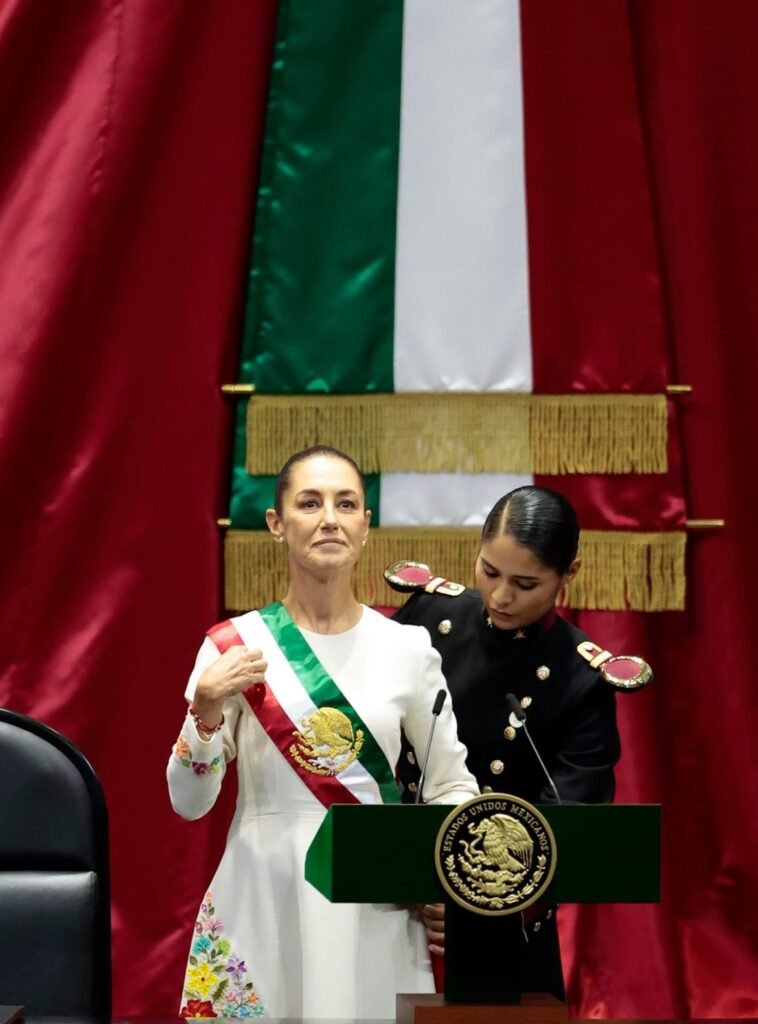
Always your country first
Claudia Sheinbaum takes office as Mexico’s first female president “It’s time for transformation, it’s time for women”

Oscar El Blue
“Now is the time for transformation, now is the time for women,” Sheinbaum said in her inauguration speech.
Claudia Sheinbaum officially became the first female head of state in Mexico on October 1, the day she was sworn in as the first female president in the history of Mexico, in a ceremony witnessed by her predecessor, Andrés Manuel López Obrador, as well as by various world leaders.
“I am a mother, grandmother, scientist and woman of faith. And from today, by the will of the people of Mexico, the constitutional president of the United Mexican States,” she said at the end of the speech to the applause and shouts of her allies in the Congress of the Union.
Claudia Sheinbaum, 62 years old and former mayor of Mexico City, comes to power after a resounding victory in the general elections of June 2: she beat her opponent, Xóchitl Gálvez, by 30 percentage points, and her coalition, Morena, achieved large majorities in Congress.
“Friends, today begins the second stage of the fourth transformation of public life in Mexico,” said Sheinbaum before her followers gathered in the central plaza of the Mexican capital.
The new president also took advantage of the space to break down the first 100 points of her Government, which will be the guide in the functioning of her Administration. A list with which Sheinbaum confirms the continuity in the “Mexican humanism” defended by López Obrador. In addition, she promised respect for the division of powers, social freedoms and diversity in the country.
The president also promised the construction of “more than a million homes” by the end of her six-year term.
“I am not here alone, we all are here”
After being elected in the elections on June 2, Claudia Sheinbaum was officially sworn in as Mexican president in front of the country’s Congress. A ceremony in which she was surrounded by shouts of support from the legislators of her party who chanted “President!” and “It is an honor to be with Claudia today.”
Sheinbaum was at the center of the power transition ceremony, where Andrés Manuel López Obrador said goodbye to the presidential sash to hand over his position in the National Palace to his successor and political protégé. The presidential sash, a political symbol of the Mexican Executive Branch, was given to Sheinbaum by Ifigenia Martínez, a historic leftist leader.
In her first presidential speech, Sheinbaum thanked the Mexican citizens for having elected her as the first female president in the country’s history and stated that she represents a transformation in the Mexican popular mentality, in which now women can also be presidents, “with an ‘a’ at the end.” “Only what is named exists,” she said.
“Today we know that women participated in the great deeds of Mexico’s history from different trenches and we also know that women can be presidents (…) And I say we arrived because I did not arrive alone, we all arrived. Mexico is a wonderful country, with an extraordinary people, we are a great nation, said the new president.”
After her speech, the new Mexican president went to the National Palace to greet the 16 heads of state who accompanied her during her inauguration, in addition to the 105 diplomatic representatives and 23 members of various international organizations who witnessed the change of mandate in Mexican territory.
Presidents such as the Brazilian Luiz Inácio Lula da Silva, the Colombian Gustavo Petro, the Honduran Xiomara Castro, the Chilean Gabriel Boric and the Guatemalan Bernardo Arévalo were some of the international guests of honor at the inauguration of the leftist.
Sheinbaum promises to continue with the “fourth transformation”
The first words of the former mayor of the capital as president were marked by constant references to the historic struggle for women’s political rights, the fight against corruption and a peculiar promise that Mexico had already heard six years ago: “I will not let you down.”
“I am a mother, grandmother, scientist and woman of faith and from today by the will of the people of Mexico, the constitutional president of the United Mexican States (…) I will not let you down, I call on you to continue making history, said the president, referring to one of the most remembered lines of López Obrador’s inauguration speech in 2019.”
She also referred to her predecessor. “Thank you, thank you, it has been an honor to fight with you, forever brother, friend, colleague Andrés Manuel López Obrador,” said the Mexican president and described López Obrador as “the most important political leader and social fighter in modern history.” López Obrador promised to retire from political life after Sheinbaum’s inauguration.
The new Mexican president, without directly naming the political opposition, also addressed the concerns of a large sector of the citizenry regarding the possible authoritarian drift of her government. One that has been fueled by two controversial constitutional reforms approved in the last weeks of AMLO’s mandate: the judicial reform and the reform of the National Guard.
Regarding this, Sheinbaum tried to calm the accusations about a possible dismantling of the Judicial Branch or the entry of members of the Army to the alleged safeguarding of the civilian population. The new president mentioned that her Administration will seek to “guarantee all freedoms.”
“Anyone who says that there will be authoritarianism is lying, Sheinbaum sentenced.”
“I tell you: in our government we will guarantee all freedoms, freedom of expression, freedom of the press, freedom of assembly, freedom of mobilization. Freedom is a democratic principle and we are democrats, human rights will be respected and we will never use the force of the State to repress the people,” said Sheinbaum, who has been criticized in the past for reprisals against feminist demonstrations when she was the head of the Government of Mexico City.
Sheinbaum gave her presidential speech alongside the two heads of the Mexican Judicial and Legislative Branch: Norma Piña Hernández, president of the Mexican Supreme Court and Ifigenia Martínez, president of the Chamber of Deputies and the Congress of the Union.
Security, migration and social justice: Sheinbaum’s main challenges
The first female head of state in the history of North America faces a complex panorama inherited by the López Obrador Administration. The president left power with good economic and employment rates – at their best for almost 10 years – but also gives up a country marked by historic peaks of violence.
Sheinbaum is receiving a strengthened economic situation due to the increase in the minimum wage promoted by López Obrador and the bonanza in employability, with an unemployment rate of only 2.6%, according to data compiled by ‘El País’. Something that, however, contrasts with the decline in access to public health and education in the country, marked by 39% of the population with health deficiencies and the stagnation of the average years of schooling with 10, according to data from INEGI.
On the other hand, the leftist president faces one of her biggest problems in the field of insecurity. López Obrador closes his Administration with more than 180,000 violent deaths recorded in the six-year term, which makes it the most violent in the modern history of the country. Something that is explained —in part— by an unnerved criminal environment dynamited by internal divisions in criminal organizations, the expansion of new cells of organized crime and a failed security strategy.
Meanwhile, Sheinbaum has ruled out returning to the criticized security strategy promoted during Felipe Calderón’s presidential term (2006-2012) with his ‘War on Drugs’. Instead, the now president of Mexico advocates for a strategy based on promoting new investigative bodies, strengthening police forces and “zero impunity” for criminals.
“In terms of security, we will guarantee the reduction of high-impact crimes, the irresponsible ‘war on drugs’ of Felipe Calderón that continues to do so much damage to Mexico will not return, our conviction is that security and peace are the fruit of justice,” said the president.
The growing migratory flows that pass through the country and the respect of the authorities for the human rights of migrants will also be great challenges for the heir of a government that has been characterized by a migration strategy attached to the interests of the United States, hardened in the south of the country and criticized by human rights defenders.
Thousands of migrants are stranded in Mexican territory, according to humanitarian groups monitoring the situation in that country, waiting for an appointment with U.S. immigration authorities.
It will be Sheinbaum who has the responsibility of smoothing things over with human rights activists, historically linked to the left, and other progressive groups that denounce the possible militarization and authoritarianism in her government.
Editorial staff and sources with: EFE, Reuters and local media

Mexican President Claudia Sheinbaum receives the presidential sash at the Chamber of Deputies on Tuesday in Mexico City, Mexico.